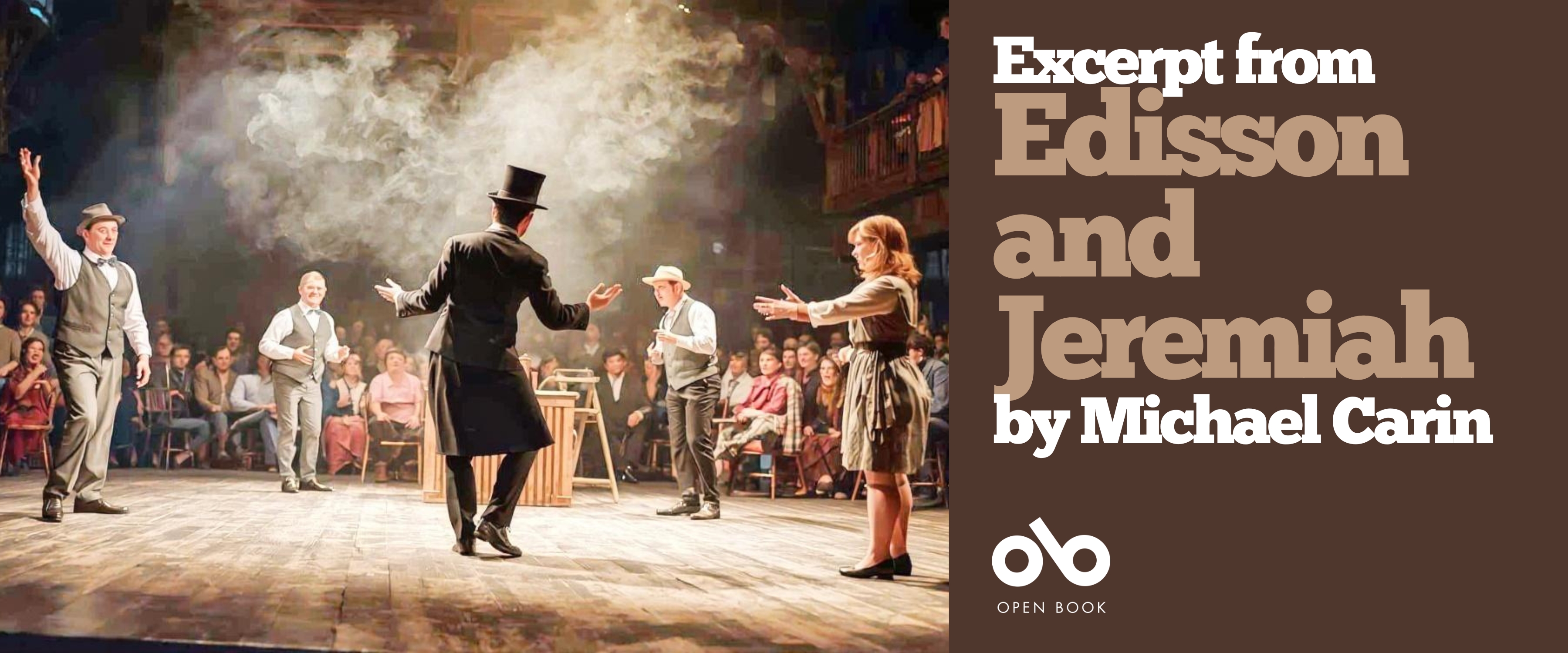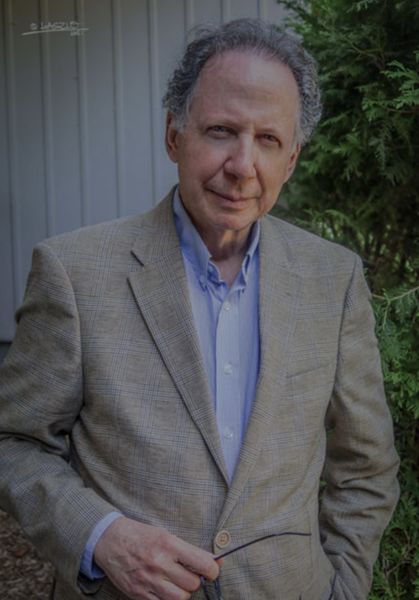Read an Excerpt from Edisson and Jeremiah by Michael Carin
The latest novel from renowned author and political theorist Michael Carin is a dazzling story of reinvention, faith, and illusion. Edisson and Jeremiah (Guernica Editions) takes readers on a journey through the heart of a fractured America, beginning in 2020, as a mysterious woman gives birth to a boy named Edisson in a world locked down by fear and uncertainty. Fourteen years later, that boy commands global attention with a magic show that defies imagination and ignites fierce debate, and that becomes a cultural flashpoint for a nation in search of meaning.
In the audience sits Jeremy Vanderbilt Delaney, a once-renowned journalist now hollowed by loss and disillusionment. As Edisson’s performance unfolds, it draws Jeremy into a haunting reckoning with his past, highlighting the scars left by fanaticism, privilege, and a nation’s deep divisions. What begins as spectacle transforms into revelation, blurring the line between illusion and truth.
With its blend of psychological depth and visionary storytelling, Edisson and Jeremiah is a provocative, redemptive tale about the power of belief and the possibility of healing. Carin crafts a story that mesmerizes while asking profound questions about faith, identity, and the fragile hope that binds a fractured world together.
Check out this excerpt from the novel, fresh off the digital presses for our readers!
An Excerpt from Edisson and Jeremiah by Michael Carin
One: 2034
When the boy’s magic show took place in the otherwise forgettable year of 2034, the Rialto had long since been designated a heritage property and turned into a venue for hire. No one suspected the art-deco movie palace, once a gem of the Roaring Twenties, would ever again know glory of any kind. The theatre now hosted amateur plays and charity entertainments, as well as weddings and bar-mitzvahs. History-making magic shows? Not so much.
The Rialto’s last memorable moment had come a century earlier with the city’s premiere of Mr. Smith Goes to Washington. A blow-up of Jimmy Stewart, arguably America’s most loved avatar, still loomed over the main entrance. In the lobby, the original blue-veined white marble was proving its durability, and a museum-grade glass enclosure boasted a teak popcorn cart from the days of Teddy Roosevelt.
The only advertisements for the show were home-made posters on nearby construction hoardings. They promised Connections and Astoundments. Alongside the pledge of uncommon hocus-pocus was a portrait of the young magician. The pencil sketch showed a boy with a shock of black hair and big eyes to match, emerging from what some saw as a cocoon and others as a dense swirl of fog. First impressions of the poster were disconcerting because the magician was clearly a freshly minted teenager, his baby-face not long outgrown.
On the day of the show, this digital summons orbited the theatre’s marquée:
TONIGHT AT 8:00 P.M. … A MAGICIAN LIKE NO OTHER … YOU WILL NOT BELIEVE YOUR EYES . . . YOU WILL SEE THINGS FALL UP!
Your CanLit News
Subscribe to Open Book’s newsletter to get local book events, literary content, writing tips, and more in your inbox
The flamboyant summons on the Rialto’s marquée was written by the owner of the theatre, Nathan Goldstein. He usually left the wording to his assistant, Amelia, but in this instance he felt like communicating a certain excitement—his own. Of course, one of his goals was to sell as many tickets as possible, but another was to share his admiration for the boy. Meeting him, then watching him demonstrate his talent, had left Goldstein more than impressed. He was inspired.
Three weeks earlier, on a quiet Tuesday morning, Amelia had poked her head into Goldstein’s office.
“Nat, there’s a young man here to see you.”
Goldstein looked up from his cDawn. “Is he in your calendar?”
“He’s not. He says he’s a magician.”
“A magician!” Goldstein laughed heartily. “Maybe he can wave a wand and fix that goddamn brickwork.”
“He wants to put on a show here.”
“Take care of it, Am. If he can pay the freight, he can put on any kind of show he likes.”
“It’s you he wants to see, Nat. He apologized for ‘disrupting’ your morning.”
“How good of the man.”
“Actually, he’s just a kid. He also said he would ‘compensate’ your attention.”
“He sounds like an oddball, my angel. Tell him the rental cost, and send him on his way.”
“Nat!”
“Whoa, why are you looking at me like that?”
“You should talk to him. He’s… I don’t know, I think you should meet him.”
Goldstein sighed and put down his cDawn. He had been reading a story about a professor in New Zealand who was infuriating theoretical physicists far and wide. For several years she had been adamantly promoting a radical theory in quantum mechanics, and just as adamantly being mocked by her peers. Goldstein had no interest in physics. His attention was drawn by the photo of the maverick professor. She was an exceptionally attractive young—
“Nat?”
“Okay, okay,” said Goldstein. “Send the kid in.”
Two: 2020
As the COVID pandemic swept the world, the boy’s mother isolated herself in a small Vermont town. She spent the time pursuing mindfulness through meditation and preparing the nursery for her son. Though she had declined an ultrasound, she knew without a doubt her child was male.
To give birth in a hospital during the pandemic was out of the question. A month before her due date, the boy’s mother hired an elderly Jamaican midwife and quarantined the woman in her basement. To colleagues, friends, and the two men she called “principal uncles” of the boy, she sent this invitation:
Disheartened by these dark days of COVID?
A redemptive moment is nigh.
You are hereby invited
to greet the birth of my son
who will soon rule my world.
On or about 15 September 2020
guests will gather behind glass.
Masks visors gowns and gloves
will be provided.
As for cameras bring your own!
The boy’s mother, clearly, was at once playful and ardently conscientious. How conscientious? She set out to abolish both accident and melancholy in her life. On the one hand, she embraced a physical routine that preserved her from even the smallest of outward hazards, and on the other followed a spiritual regimen to promote serenity.
The boy was born on his anticipated due date. He slid almost effortlessly into the world. The Jamaican midwife cried out in a tropical singsong, “Lordy, lordy, nevah seen me the like,” with an edge that left unsaid I ain’t foolin’, man, I ain’t damn foolin’! Her name was Fiona and she had four children of her own, all sons. Though everyone assumed her cries were responding to the ease of the delivery, she was in truth expressing bewilderment at something in the boy’s face.
It was a fine-looking infant face, yet unusual. Foreign? Somehow ill-fated? No—just a difference she could not put into words except to say she had never seen it before.
The boy apparently felt no reason to cry. He seemed preoccupied, perhaps still intent on some unfinished business in the womb. He answered Fiona’s slap, to the astonishment of his rapt audience, with a feisty burp. Then he opened his eyes to the wonders of existence.
His immediate environment was bordered by plexiglass and spacesuited gawkers. When he studied the photos years later he would dub the spectators “moon creatures.” The black woman who tenderly pulled him into existence was also garbed for outer limits adventure. Only his mother looked like a person, her bare face resplendent with triumph.
In her arms, resting on her breast, the boy, now nearly a minute old and basking in alertness, let out a long sagacious squeal of laughter.
Three: 2034
On any other occasion in Nathan Goldstein’s life, if a young visitor claiming to be a magician walked into his office, the theatre owner would have sprung to his feet, extended a hand, and said with a boom in his voice, “Great to meet you, kid! I hear you’re a magician.”
On that quiet Tuesday morning, however, something about the young visitor made Goldstein forget to stand up. He said to his wife Sheila that evening, “The kid was dressed like an ordinary kid. He looked like a lot of other kids. But for a second there he confused me. I went sideways.”
“What are you saying?”
“I don’t know. The kid put me off balance. He had a way about him.”
“A way?”
“Yeah, an air about him. Something!”
“How old is he?”
“I think he said fourteen.”
“So, a kid of fourteen put Nat Goldstein off balance because he had an air about him?”
“Sheil, that was just the start.”
Four: 2020
During his first forty-eight hours, the boy entered his mother’s life much like an army of a million would conquer a village. The process of conquest was all-engulfing.
He still had not cried. When he was not at his mother’s breast he was either gurgling, muttering, or making sounds that ranged from quiet glee to all-out hilarity. His mother had the impression he was constantly tickled by the world. Whether it was a stuffed giraffe or nothing more than the bare ceiling above, his eyes would discover delight.
On the third day of the boy’s life, when his mother finally moved her son to his crib, this happened:
The instant she put the boy down he let out a piercing scream. A scalded cat could not have let loose a more offended sound. It went on, the scream of complaint, until she scooped up the infant.
The obvious culprit was the crib. The boy must have felt imprisoned. His proper station was atop a borderless place, a boundless place. His mother learned this by laying him in the middle of her large bed, whereupon the boy’s spasms of joy immediately resumed. Whenever she tried laying him in the crib he just as quickly became an enraged banshee.
Thus the infant took up residence in his mother’s bed. She adored having him there. She spent hypnotic hours gazing at the phenomenon of him: his delicate features, natural state of gladness, his glow. Thanks to him she was seeing poetry everywhere as she felt the stir and might of the deepest mysteries in this tiny being plucked from the momentum of generations and, yes, from the savage drive of her lust.
She felt an elation she could not have predicted. The feeling arose from the energy she drew from her infant—from the synchronized spectacle of his waving arms and churning legs when he signaled hunger and summoned her breast.
And from his eyes! He was not yet days old and she was seeing in his black eyes a greedy curiosity, a mixture of vexation and resolve, of stubborn inquiry into what the world was, where it was going, and why.
Katty, she said to herself, you are traveling in unexplored territory, once-in-a-universe territory, the life path of your son. The remarkable thing was her certainty that this thought did not take flight from inside her but from a runway within him.
__________________________________________
Michael Carin trained as a political theorist at McGill University, where he also studied under the godfather of Canadian literature, Hugh MacLennan. He is the author of several novels including Five Hundred Keys, The Kremlin Papers and the work of alternate history Churchill At Munich. His non-fiction response to the Holocaust, The Future Jew, won him wide recognition as a provocative secular humanist. Mr. Carin lives in Montreal.






